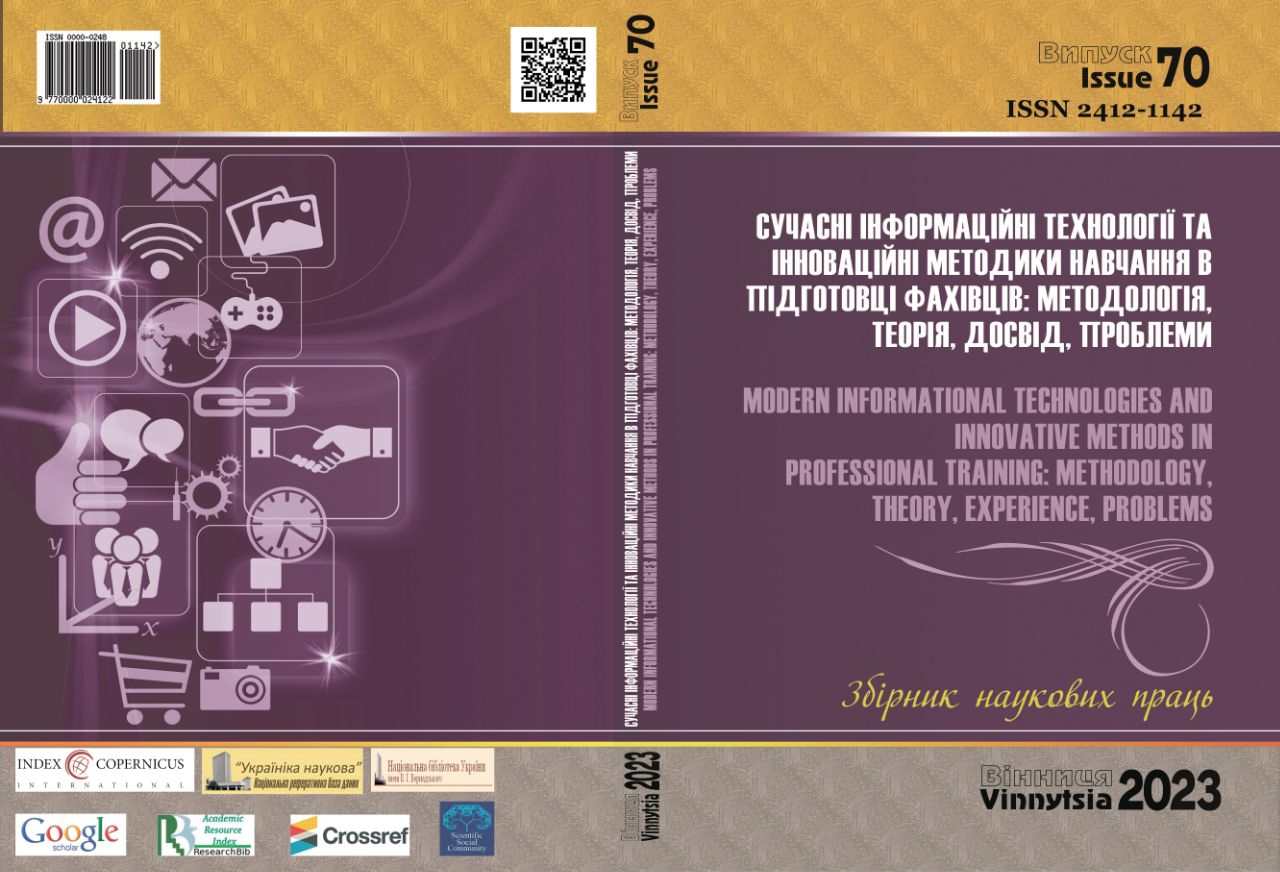SYSTEM OF CURRENT PROFESSIONAL AND LIFE SKILLS OF PRIMARY SHOOL TEACHERS
DOI:
https://doi.org/10.31652/2412-1142-2023-70-106-114Keywords:
primary school teacher, life skills, skills of the 21st century, teacher's professional skills, pedagogical educationAbstract
The article based on the analysis of modern societal demands, was found that the labor market today requires not so much a specialist to have a diploma, but with the certain set of life skills. Scientists from different countries claim that the skills necessary for successful life in the 21st century are formed at an early age, so the primary education system faces a significant task. In the system of 21st century skills, the main ones are defined as higher level cognitive skills, hard and soft skills, digital skills and survival skills. The author of the article proves that in order to form a certain set of life skills of the 21st century in pupils, primary school teachers themselves must possess a system of relevant professional and life skills. The author determined what professional and life skills Ukrainian primary school teachers should have in order to prepare pupils for successful life in the changing and unpredictable conditions. The article considers the system of key professional and life skills that are necessary for the work of a primary school teacher. The author analyzes modern requirements for pedagogical activity and pedagogical competence, in the context of the requirements of the modern educational environment. The main skills, namely the formation of the competence of the elementary school teacher, including the development of creativity, the ability to work in a team, adapt to changes in the field of education and effectively interact with students and their parents, are proposed for consideration in the article. A generalized system of skills is presented and can help primary school teachers effectively fulfill their professional mission and promote the harmonious development of the pupils' personality in primary school. The research points to the importance of developing a set of skills that include not only pedagogical professionalism, but also adaptation to modern requirements of the socio-cultural environment and improvement of the teacher's communicative, technological, and organizational skills
Downloads
References
Voogt J., Erstad O., Dede C., Mishra, P. Challenges to learning and schooling in the digital networked world of the 21st century. Journal of Computer Assisted Learning, 2013. 29(5), Р.403–413.
Коломієць А. М., Громов Є.В., Жовнич О. В., Коломієць Д. І., Івашкевич Є. М. Актуалізація навичок педагога, що необхідні для організації освітнього процесу в умовах надзвичайних ситуацій. Сучасні інформаційні технології та інноваційні методики навчання в підготовці фахівців: методологія, теорія, досвід, проблеми. 2022. № 65. С. 147-155.
Лазаренко Н. І. Тенденції професійної підготовки вчителів у педагогічних університетах України в умовах євроінтеграції.: дис. … доктора пед. наук : спец.. 13.00.04 – "Теорія і методика професійної освіти"; Інститут педагогічної освіти та освіти дорослих імені Івана Зязюна, НАПН України. Київ 2020. 571 с.
Жовнич О. Пріоритети професійної підготовки майбутніх учителів початкових класів: аналіз європейського досвіду. Сучасні інформаційні технології та інноваційні методики навчання в підготовці фахівців : методологія, теорія, досвід, проблеми. 2023. Вип. 68. С.50-60.
Teo T., Unwin S., Scherer R., Gardiner V. Initial teacher training for twenty-first century skills in the Fourth Industrial Revolution (IR 4.0): A scoping review. Computers & Education. 2021. V.170, 104223.
Baysal Z. N., Arkan K., Yildirim A. Preservice elementary teachers’ perceptions of their self-efficacy in teaching thinking skills. Procedia - Social and Behavioral Sciences, 2010. 2(2), Р.4250–4254.
Kaya B. Sosyal bilgiler öğretmen adaylarının düşünme becerilerinin öğretimine yönelik öz yeterliklerinin değerlendirilmesi. Yayınlanmamış Doktora Tezi, Gazi Üniversitesi Eğitim Bilimleri Enstitüsü, Ankara. 2008.
Bowman M., Vongkulluksn V., Jiang Z., Xie K. Teachers’ exposure to professional development and the quality of their instructional technology use: The mediating role of teachers’ value and ability beliefs. Journal of Research on Technology in Education, 2020. V. 54. Issue 2. Р.188-204.
Sali G., Akyol A. K. Creativity of preschool and elementary school teachers and their students. Perceptual and Motor Skills, 2015. 121(3), Р.759–765.
Rich K., Yadav A., Schwarz C. Computational thinking, mathematics, and science: Elementary teachers’ perspectives on integration. Journal of Technology and Teacher Education, 2019. 27(2), Р.165–205.
Tornero B. Prospective primary teachers’ perceptions about their ability to use and teach thinking skills. Journal of Constructivist Psychology, 2017. 30(2), Р.127–145.
Cohen Zilka G. Teacher's Place as an Educator in Social Interaction, in the Digital Age, From the Point of View of Preservice Teachers Completing Student Teaching in Primary and Secondary Schools. Journal of Educators Online. 2022. Vol. 19 Issue 1, P.161-175.
Parmigiani D., Jones S., Kunnari I., Nicchia E. Global competence and teacher education programmes. A European perspective. Cogent Education. 2022.Volume 9, Issue 1. Р.123-131.
Фрицюк В. А. Теоретичні та методичні засади підготовки майбутніх педагогів до безперервного професійного саморозвитку : дис. … док. пед. наук 13.00.04 – теорія і методика професійної освіти. Вінницький держ. пед. ун-т ім. М. Коцюбинського. Вінниця, 2017. 532 с.
Downloads
Published
Issue
Section
License
Copyright (c) 2023 Жовнич Олеся Володимирівна

This work is licensed under a Creative Commons Attribution 4.0 International License.





